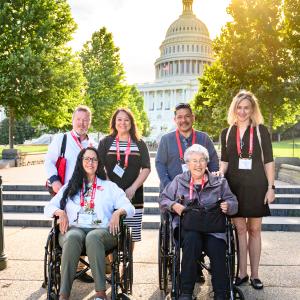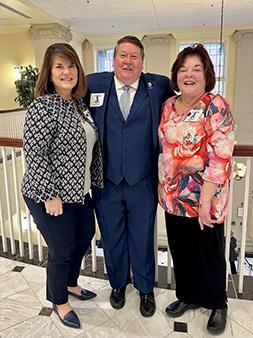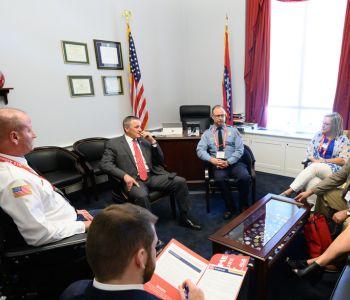It is always gratifying when hard work pays off, and for the ALS community, there have been many policy wins to celebrate recently. These successes are the direct result of the efforts of more than 40,000 ALS advocates across the country, working tirelessly with The ALS Association to make an impact for people living with the disease.
Advocates nationwide urged the FDA to approve Relyvrio (AMX0035) and Qalsody (tofersen), efforts that were vital in bringing these two new treatments to the ALS community in the last two years, and their hard work has continued to bring new funding for ALS research and programs. In recent years, funding has increased at the National Institutes of Health (NIH) from $48 million in 2014 to $124 million in 2022, and at the Department of Defense from $5 million in 2008 to $40 million in 2022. Advocates also helped secure $5 million specifically for ALS research at the FDA beginning in 2022.
UPDATE – APRIL 2024: Relyvrio was voluntarily withdrawn from the market by Amylyx following a phase 3 trial that failed to show it was effective. The ALS Association stands by its decision to push for early approval of Relyvrio given the promising phase 2 trial data and the safety of the treatment. At the time, we said that if it turns out to be ineffective, at worst, people living with ALS would have taken an ineffective therapy without risk of harm. If it was indeed effective, delaying access would have meant that people living with ALS would have lost two years of being able to take a life-extending therapy. In the interests of transparency and education, we are leaving this information up for future reference. People living with ALS need life-saving treatments and we are working as urgently as possible to advance the many more potential treatments in clinical trials.

ALS advocates have also spent countless hours informing their senators and representatives about the critical needs of people living with ALS and their families and caregivers. The relationships they have built helped secure the signatures of 80 representatives and 32 senators on 2023 “Dear Colleague” letters requesting increased funding for ALS in support of our effort to find new treatments and cures, optimize current treatments and care, and prevent or delay the harms of ALS.
But while proud of what has been done, we are by no means satisfied. In fact, these successes prove that raising awareness about ALS with elected officials can, and does, lead to tangible results. Much of that important public policy work is done in Washington D.C., but it is far from the only place ALS advocates can make an impact on the course of the disease.
Enhancing our advocacy efforts on the state and local level is key to empowering people with ALS and their families to fight for better public policies in their own communities. In 2022, The ALS Association established a nationwide state policy and advocacy department, and since January 1, 2023, we have taken a position on 362 bills in state legislatures across the country.

Often, state-level legislation can move faster than legislation at the national level. It is also true that Congress will often look at what is happening at the state level to inform them if national legislation might be needed on certain issues. An example of this playing out right now is the Genetic Testing Protection Act of 2023 in Maryland.
Currently, a federal law, the Genetic Information Nondiscrimination Act (GINA), prohibits employers and health insurers from discrimination based on the results of genetic testing. There are 14 states that have enacted laws to extend those protections to include life insurance, long-term care insurance and disability insurance. But as it currently stands, those who do not live in those states do not have such protections.
With the approval of Qalsody (tofersen) and other therapies targeting ALS-linked genes currently being tested in clinical trials, the ability for people with ALS to have access to genetic testing without fear of discrimination has never been more vital which is why the Association and ALS advocates are leading the fight for these protections in state houses across the country.

ALS Association leaders and advocates recently testified on the importance of genetic testing for people with ALS in support of the bill before both the Maryland House of Delegates and the Maryland State Senate in what they hope can be a model to move similar legislation in other states.
A vote on the Genetic Testing Protection Act has not yet been scheduled, but The ALS Association and advocates will continue to push for this important piece of legislation. Additional focus on state funding for ALS care services and access to affordable Medigap plans for people with ALS who are under the age of 65 is also a priority.
Even with all that has been achieved, The ALS Association and ALS advocates have no intention of slowing down. Each meeting, phone call or letter is an opportunity to gain the support of state and federal lawmakers to make a positive impact on the lives of people living with this disease. You can join us by signing up to become an advocate and asking your lawmakers to help make ALS livable for everyone, everywhere, until a cure is found. Sign up TODAY!
Learn more about ALS and how you can get involved to help people impacted by the disease.
Do you want to share your story with the community to help make a difference for people living with ALS and their families? Visit our website HERE.
To continue to follow stories about people living with ALS in the community and learn more about the disease, subscribe to receive our weekly blogs in your inbox HERE or follow us at als.org/blog.


Join the conversation. Please comment below.